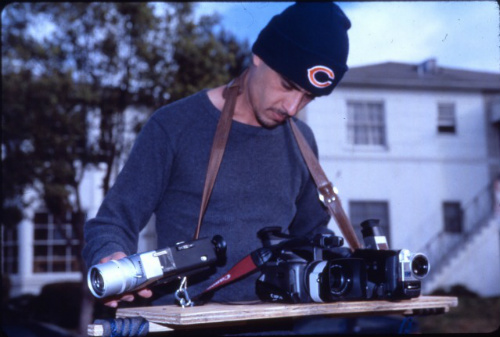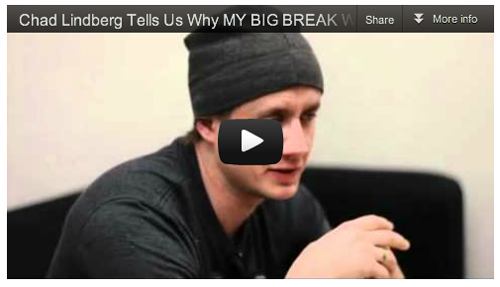
TONY ZIERRA – FILMMAKER
In 1995 I moved to Hollywood with the intention of making movies. Despite the typical and endless obstacles I managed to make a low-budget feature, but it ended up being a disaster. I naively trusted a predatory distributor (unfortunately there are plenty of those in L. A.) and quickly lost everything. I wound up living on the street.
Within a few months I was back on my feet and ready to give it another try. I
found a job and a cheap place to live with a bunch of rowdy, struggling actors in a house we called “Masselin”. I got to crash on the living room couch, which made my rent affordable.

CHAD LINDBERG, GREGORY FAWCETT AND DIRECTOR TONY ZIERRA
Masselin was one of the most amazing places I ever lived. It was magical, filled with energy that pulled you in and kept you charged with ideas and creativity. Hanging at Masselin was a tribal ritual – Hollywood style. There were real characters and fascinating stuff happening all the time. I saw memorable scenes buried in the chaos of daily life and heard the best dialogue I couldn’t dream of writing.
I was constantly trying to find a good script and raise money so I could attract name actors, but nothing had come through. Then one day it came to me – why not make a movie about my roommates? It’s not like I had a lot of options. All I needed was a camera, time and lots of patience. Patience in filmmaking comes from passion and belief in your project, and I had both. Back in the 90’s, when the project started, it was considered strange to film the reality of ordinary life and a lot of people who heard what I was doing thought it was a waste of time. I knew I’d eventually end up with a story to tell, but I never expected that I’d end up documenting a series of events that only fate could have created.
Early filming was spontaneous, constant and intuitive. I filmed everything and the guys were glad to have a chance to be on camera while they pursued their dreams. Slowly, the process became more methodical and involved more preparation. I learned to be ready for anything and was able to capture the essence of the subjects and their surroundings. I managed to keep shooting by working odd jobs, borrowing and even having garage sales to raise some cash.
I thought I’d probably end up filming at least some of the guys giving up and
going home because that’s what happens to so many Hollywood hopefuls. But things took an unexpected turn. Three of my roommates (Wes Bentley, Chad Lindberg and Brad Rowe) beat astronomical odds and became rising stars. Incredibly, I was there to capture it all.
As the guys’ careers took off, the media became curious and covered the story. Sundance wanted to look at an early cut and even extended their deadline to get a copy. The sudden interest made me frantic and overworked because editing was financially and creatively problematic. At the time there was no way for independent filmmakers to edit affordably. Post facilities were expensive. Having so much footage (over 200 hours) was unheard of and managing media was a nightmare. I edited when I could and shopped the footage around to get finishing funds. For the final push I found two friends who were willing to financially help me complete an early cut so I could submit it to festivals and show distributors.
I didn’t have a cut for Sundance but I just barely made the deadline for The
Toronto International Film Festival. I was stunned and excited when the film, that I’d titled “Carving Out Our Name”, was accepted.
When word got out that “Carving” had gotten into TIFF, Hollywood came
knocking on my door. Cassian Elwes and Rena Ronson, who headed the independent division of The William Morris Agency, sang the praises of “Carving” and rolled out the red carpet beneath my exhausted feet. After years of shooting, scraping and struggling I was living the independent filmmaker’s ultimate dream.

DIRECTOR TONY ZIERRA
At TIFF, “Carving” got a lot of media attention and had a successful premiere with an audience of over 1,000 people. Million dollar deals were on the table, but once again unpredictable twists took over the story and this time my luck turned against me. “Carving Out Our Name” ended up being crushed between a historic disaster and Hollywood insider power politics that suddenly made it untouchable. I tried to fight against circumstance and the system but there was no way around it.
I was sent into a spiral of loss and sadness. Tired, ill, depressed and broke, my passion faded and I became hooked on substances to dull my senses. The
only way to literally survive was to get away. I left Hollywood, cut all ties and destroyed all prints of “Carving”.
It took years before I could even think about the original footage that I’d stored in a barn-like shed. After a difficult period of rebuilding myself and getting clean, I hauled out all 200 hours and made an attempt to cut a new version. It was like opening an old wound and I stopped again. Then, early in 2008, the death of Heath Ledger, who had been a friend, shocked me and gave me new purpose. I feared that others I had cared about in L.A. were going to die – I myself barely escaped. I felt that the movie could shed light on life in the industry and show how people can easily get sucked into the system and deteriorate. With newfound clarity, I faced the footage with determination to release my film no matter what. The arrival of Final Cut Pro had made editing affordable and media management much easier.

HEATH LEDGER
The film became “My Big Break”, about a group of Hollywood newcomers who set out to follow their dream – before, during and after making it. “My Big Break” was more realistic, harsh and honest than “Carving”. This time I wasn’t alone. I had the support of a determined producer, Elizabeth Yoffe, who encouraged me and always reminded me why we were making this project. After several cuts, a lot of emotional ups and downs, and more obstacles – we stopped when the story finally had its proper ending.
Film distribution has radically transformed in the years since I first started
shooting. Back when the gatekeepers shut the door on “Carving”, the movie
died. Now the internet makes it possible to bring “My Big Break” directly to the audience. Although some reputable distributors approached us, we decided to pass and maintain control over every aspect of the film. It isn’t easy to do. Even with festivals, strong social media, word of mouth and support from the indie community, it’s difficult to get the marketing I would have hoped for – or the money. But I created something handmade and I can deliver it to every audience member who wants to see it. That’s satisfying.
People often ask, “What lessons did you learn from making “My Big Break” that you can share with others?” My answer is: All the lessons I learned are in the movie; that’s why I finished it. The struggles we each experienced are laid bare as cautionary tales. I hope “My Big Break” will inspire people to be prepared for anything that comes their way, to always appreciate opportunities they’ll be given, and to persevere in the face of obstacles they’ll encounter.

BRAD ROWE, CHAD LINDBERG, GREGORY FAWCETT AND WES BENTLEY
BIO:
Tony Zierra has been fascinated by the power of storytelling and cinema since he was a child. When time and money permitted he took film classes at NYU and later at Texas A & M and UCLA. He is currently working on multiple projects with True Studio Media including films, books and multimedia documentary performances.
Please visit:
Actor Chad Lindberg tells us why MY BIG BREAK will always be a part of his life. He also shares why it is a teaching tool for filmmakers, actors and others in the industry, and he gives us his advice on following your dreams.
Filmmaker Tony Zierra and Actor Chad Lindberg of the documentary My Big Break join us on Film Courage to share with us their true and remarkable Hollywood story, that of three actor roommates who rose to stardom in the early 2000’s (Chad Lindberg, Brad Rowe, & Wes Bentley). We learn whether it was fate or not that brought them together, whether one can sustain a Hollywood career without a ‘big break,’ and why Hollywood doesn’t want you to see this film.
Watch MY BIG BREAK documentary:


























